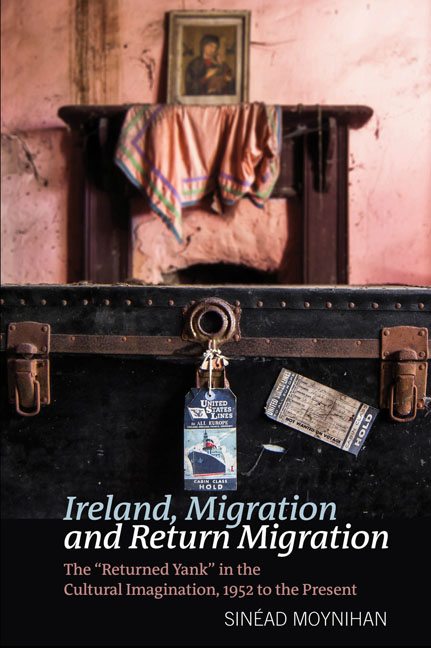 Ireland, Migration and Return Migration
Ireland, Migration and Return Migration If an Irish writer like me is heavily censored at home, he loses his sense of having a literary nationality. Because the Irish didn't accept me as a writer, I didn't think to myself, I’m going to always write about Ireland. I said to myself, I’ve written Irish books; I’m living abroad; I must move on.
Brian Moore, ‘Interview with Julia Carlson’So Ireland will always be my motherhood, both in a literary sense and in spiritual sense.
Edna O’Brien, ‘Interview with Mark Lawson’In a 1970 interview with David Haycock, Edna O’Brien contrasted her childhood and adolescent reading of works such as Daphne du Maurier's Rebecca (1938) with her subsequent formative discovery of James Joyce's work – collected in the anthology Introducing James Joyce (1942), edited by T. S. Eliot – in a bookstall on Dublin's quays when she was 19 years old:
that was the first time I ever read a writer who seemed not to be a writer, who seemed to present life. All these Rebeccas – they were fabrications about fictional people. The first of the Joyce extracts was the Christmas dinner scene from Portrait of the Artist, and then there was a story about a girl, Evelyn [sic], who wanted to run away from home. They could have been my experience.
By identifying with the title character of ‘Eveline’ (1904, 1914), the story of a young woman with a very circumscribed life as a shopgirl and housekeeper for her father who contemplates (and eventually decides against) leaving Ireland for Buenos Aires with her beau, O’Brien retrospectively situates her 19-year-old self as an aspirant exile. Indeed, O’Brien was working in a Dublin pharmacy when she eloped, and eventually emigrated, with an older man of whom her family did not approve. However, this oppositional framing of Rebecca (‘popular’; women's fiction that is full of ‘fabrications about fictional people’) with Joyce (‘serious’; canonical; ‘present[ing] life’) is disingenuous, for elsewhere in the same interview – and, more importantly, in much of O’Brien's fiction – the profound influence of du Maurier's novel on her work is palpably felt. Rebecca was one of three novels, along with Margaret Mitchell's Gone with the Wind (1936) and Richard Llewellyn's How Green Was My Valley (1939) that, in the absence of a formal circulating library in O’Brien's local village of Scariff, Co.
To save this book to your Kindle, first ensure no-reply@cambridge.org is added to your Approved Personal Document E-mail List under your Personal Document Settings on the Manage Your Content and Devices page of your Amazon account. Then enter the ‘name’ part of your Kindle email address below. Find out more about saving to your Kindle.
Note you can select to save to either the @free.kindle.com or @kindle.com variations. ‘@free.kindle.com’ emails are free but can only be saved to your device when it is connected to wi-fi. ‘@kindle.com’ emails can be delivered even when you are not connected to wi-fi, but note that service fees apply.
Find out more about the Kindle Personal Document Service.
To save content items to your account, please confirm that you agree to abide by our usage policies. If this is the first time you use this feature, you will be asked to authorise Cambridge Core to connect with your account. Find out more about saving content to Dropbox.
To save content items to your account, please confirm that you agree to abide by our usage policies. If this is the first time you use this feature, you will be asked to authorise Cambridge Core to connect with your account. Find out more about saving content to Google Drive.